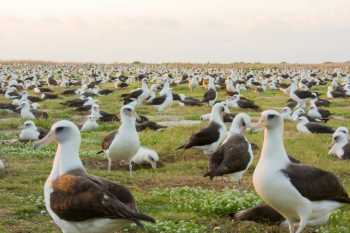Whereas on-going efforts to rid seabird islands of introduced mammalian predators (such as cats and rats) are well known, efforts to eradicate or control alien plants on islands are generally not so well reported. However, plants introduced to islands often become invasive when they can seriously alter natural ecosystems, with deleterious effects on indigenous biota, including ACAP-listed albatrosses and petrels.
Efforts currently underway to eradicate alien plants on some of the more important albatross and petrels islands around the World are summarized below.
Eastern Island (Midway Atoll National Wildlife Refuge, North-western Hawaiian Islands) in the North Pacific is the site of a five-year, US$1.8 million effort by the U.S. Fish and Wildlife Service to eradicate Golden Crown-beard Verbesina encelioides, a daisy-like plant that spreads readily and develops into waist- to head-high bushes, limiting habitat for breeding populations of seabirds, including ACAP-listed Black-footed Phoebastria nigripes and Laysan P. immutabilis Albatrosses. It has been found that the island's birds do not build nests in existing stands of Verbesina, decreasing available nesting habitat and new stands can grow rapidly around existing nest sites, preventing parent birds from feeding their chicks. The chicks can then become trapped and are unable to fledge (click here).

Concerted attempts to eradicate Verbesina are also being made on Kure Atoll, another important albatross island in the North-western Hawaiian Island chain, where dense stands of the plant reduce air circulation and raise humidity during the hottest time of the year, increasing the risk of heat stress to both breeding adults and chicks.
Elsewhere, in the South Atlantic eradication or control efforts are proceeding on all four islands in the Tristan da Cunha group, for Procumbent Pearlwort Sagina procumbens on Gough, New Zealand Flax Phormium tenax (and other plant species) on Nightingale and Inaccessible, and for Loganberry Rubus loganobaccus on the main island of Tristan. A comprehensive survey of alien plants on the main island, concentrating on the Settlement Plain, is now available on-line.
In recent years Wavy Bittercress Cardamine flexuosa was found at King Edward Point, South Georgia (Islas Georgias del Sur)*, thought brought in by building contractors. Despite attempts to control the plant, it has continued to spread (click here).
Over in the southern Indian Ocean alien plant surveys have been undertaken in the last few years at the South African Prince Edward Islands where efforts are continuing to eradicate two introduced grasses, Red Top Bent Agrostis gigantea and Couch Grass Elytrigia repens, which have as-yet limited distributions on Marion Island. Several other plant species, including Sagina procumbens and Cerastium fontanum, are deemed to have spread too far around both the islands in the group to be eradicated.
Somewhat in contrast in the southern Pacific only three alien plants (Annual Meadow Grass Poa annua, Cerastium fontanum and Common Chickweed Stellaria media) are found on Australia's Macquarie Island, where a recent island-wide survey of their distribution has been undertaken.
With thanks to Martin Hamilton, Peter Ryan and Justine Shaw for information.
John Cooper, ACAP Information Officer, 3 July 2011
*A dispute exists between the Governments of Argentina and the United Kingdom of Great Britain and Northern Ireland concerning sovereignty over the Falkland Islands (Islas Malvinas), South Georgia and the South Sandwich Islands (Islas Georgias del Sur y Islas Sandwich del Sur) and the surrounding maritime areas.

 English
English  Français
Français  Español
Español